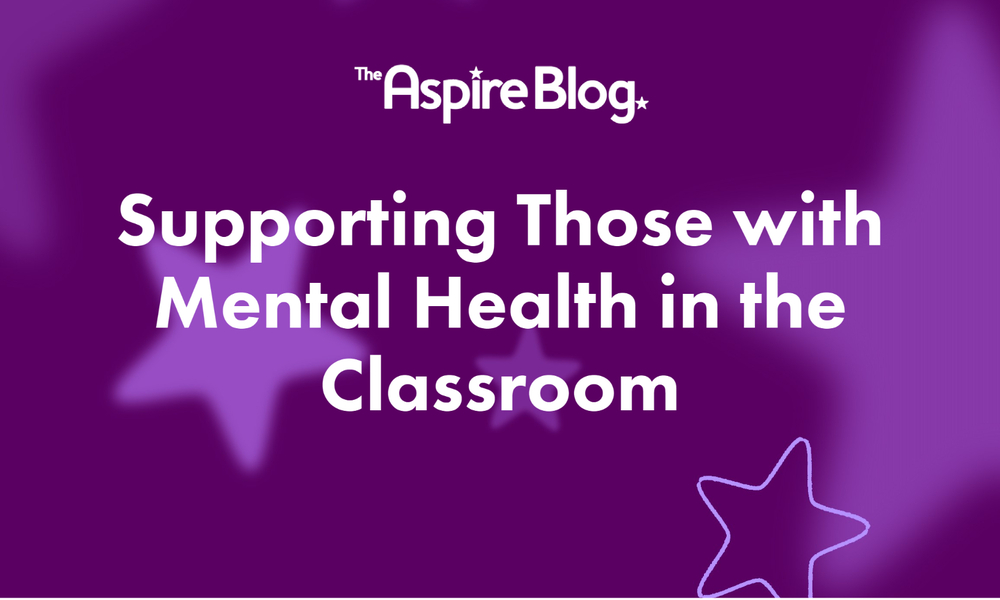Supporting Those with Mental Health in the Classroom
Published date: 2019/10

We know working in schools can be very fast paced and hectic, pupils may often find themselves struggling to cope with the pressures and demands of school life. As an educator you may see changes in pupils within your school and classroom, are they struggling to concentrate, avoiding group situations, or not attending your lessons? Take a look at more signs and ways to help as an educator.
Most Common Mental Health Disorders Among Students
A first good step as an education professional is to learn about the mental health disorders that are most common among children.
Most common mental health disorders:
Anxiety
Depression
Although these may be generalised, in most cases they have a knock on effects such as:
Eating disorders
Obsessive compulsive disorder (OCD)
Insomnia
Phobias
Dealing with Anxiety
Anxiety is known to be the most common mental health disorder amongst students, with 42.8% of students often or always feeling worried. Almost nine in 10 (87.7%) said they struggled with strong feelings of anxiety. With anxiety being so common within the school environment it is crucial as a teacher to recognise and know how to deal with students who may need help.
Signs of Anxiety:
Being excessively worried
Having panic attacks
Being Irritable
Avoiding social situations or activities within the classroom
Having difficulty concentrating
How to Help
As a teacher, if you spot these signs of anxiety within the classroom is easy to subtly help pupils without directly speaking to them.
Setting clear lesson plans. This may help students as they then are aware of the tasks set. Having an unorganised classroom or lesson plan may increase levels of anxiety due to students feeling worried they are not doing what is expected of them, however they then may feel afraid of speaking up within the classroom or directly to teachers. The lack of organisation in a classroom may also cause the student to feel on edge and potentially worsen a battle with OCD (obsessive compulsive disorder)in some cases.
Allowing flexible deadlines with homework and tasks, although it is important to have work in for specific times if a student is struggling with anxiety they may feel especially under pressure if they are unsure on their work or are having difficulty concentrating on their work.
Ensure the way you present yourself is in a calm manner, showing self control and being relaxed in situations that some may struggle with may have a positive impact on the student as they may recognise that they can personally act this way.
Dealing with Depression
Depression is another mental health disorder that is very common within young people, recognising signs of depression is very important as over time it may progress and cause severe depression.
Signs of Depression:
Changes in appetite and weight
Continuous low moods
Having low self esteem and doubting self worth
Lacking motivation
How to Help:
Reassuring students may help to build up self esteem, praise their good work and let them know how well they are doing. By helping to boost their self esteem even by small amounts could improve the way they feel about themselves.
Allowing students to be independent in revision in classrooms and allowing music to be incorporated whilst studying can help with low moods. Music can be relaxing and help to motivate pupils in their activities.
Seeing students every day you may notice small changes in physical appearances such as weight loss or gain. This could be due to low self esteem.
With mental health being so common in young people it is important to recognise signs and ways to help, as a teacher you could provide easily accessible resources to a class and people to reach out to.
While these problems are distressing, through counselling we can help students to understand them, and then suggest strategies for dealing with their feelings.
As a teacher if you see a student who is showing strong signs of any mental health problems it is crucial to report to someone else within a school or a parent as soon as possible.
If you are an educator struggling with mental health problems read our blog on How to Deal with Mental Health as a Teacher. We also offer many other resources for teachers on the Aspire Blog, get in touch with us today for more information.
